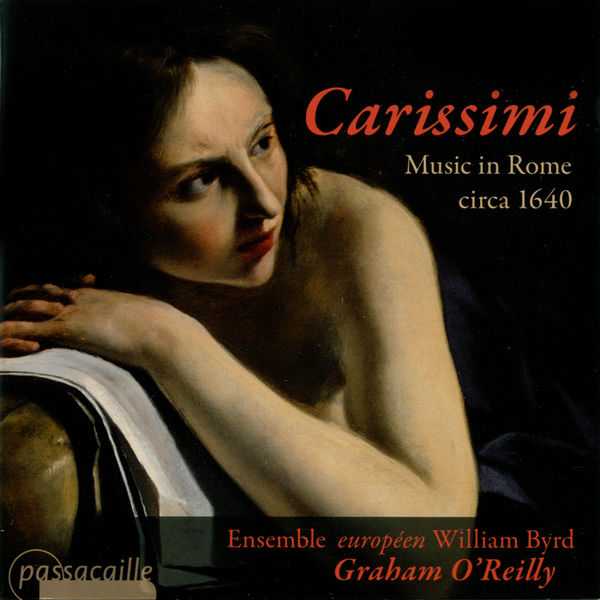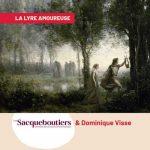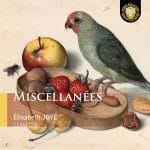
Composer: Giacomo Carissimi, Girolamo Frescobaldi, Marco Marazzoli, Paolo Quagliati, Luigi Rossi, Michelangelo Rossi
Performer: Ensemble européen William Byrd, François Fauché, Catherine Greuillet, Bruno Boterf, Alena Dantcheva, Vincent Bouchot
Conductor: Graham O’Reilly
Number of Discs: 2
Format: FLAC (tracks)
Label: Passacaille
Catalogue: PAS940
Release: 2007
Size: 409 MB
Recovery: +3%
Scan: cover
CD 01
Carissimi: Vanitas vanitatum a 5 ‘Contemptus mundi’
Prim01. a pars: Sinfonia, Proposui in mente mea
02. Secunda pars: Hinc, mortales, ediscite
03. Rossi M: Toccate e correnti: Toccata settima
Carissimi: Historia Jephte a 6
04. Sinfonia, Cum vocasset in proelium
05. Cum autem victor Jephte
06. Cum vidisset Jephte
07. Abiit ergo in montes
08. Plorate, filii Israel
09. Rossi L: Salve Regina a 3
CD 02
01. Quagliati: Toccata dell’Ottava Tuono (Il Transilvano, 1593)
Marazzoli: Il Predica del Sole a 5
02. Ergi la Mente al Sole
03. Io sono il Sole
04. Ma sentite mortale
05. Si corra, si voli
06. Quagliati: Ricercari e canzoni: Canzona
Rossi L: Il Predica del Sole a 5
07. I. Ergi la Mente al Sole
08. II. Io sono il Sole
09. III. Ma Sentite mortale
10. IV. Si corra, si voli
11. Frescobaldi: Toccate intavolatura di cembalo e organo… libro secondo: Aria detto Balletto
Carissimi: Audite omnes quodquod estis a 3
12. Audite omnes quodquod estis
13. Nequaquam mori peccatorem
14. Carissimi: Mottet sur la Vanité des hommes a 2
15. Carissimi: Mottet sur la Vanité des hommes a 2
16. Carissimi: Mottet sur la Vanité des hommes a 2
17. Carissimi: Mottet sur la Vanité des hommes a 2
With the exception of the oratorio Jephte, included in this handsome double-disc release, the music of Giacomo Carissimi has proven a tough sell even among audiences devoted to music of the seventeenth century. This album both shows why and takes a step toward dispelling the difficulty. As the title Carissimi: Music in Rome circa 1640 rather awkwardly implies, the program juxtaposes Carissimi’s music with that of several contemporaries. There are keyboard toccatas in the Frescobaldi vein, as well as vocal works similar to the smaller Carissimi pieces. Director Graham O’Reilly and keyboardist Yannick Varlet (who plays a terrific small organ) emphasize the Jesuitical connections of this music, which is exactly what makes it difficult. The texts are complicated dialogues, packed with ideas, and mostly set in a flexible recitative. At first it’s as if you’ve stumbled into a biblical debating society where everyone talks in music, but once you adjust yourself to the mood, the nature of the language becomes clearer. Consider the opening Vanitas vanitatum a 5, by Carissimi, with its lengthy prose text glossing the Book of Ecclesiastes. The soloists offer lists of earthly accomplishments and riches that take on an increasingly heated, almost urgent tone, only to be answered by the chorus each time with an implacable “Vanity of vanities, and all is vanity.” The “chorus” consists merely of all the soloists joined together; there is no choir, even in the crowd scenes of Jephte. This approach is more justifiable here than in Bach, given the chamber quality of the music and the absence of congregational chorale singing as a conceptual backdrop. The issue is not as cut-and-dried as O’Reilly and Varlet argue in the booklet: the fact that Carissimi matched the number of parts in his choruses to the number of characters in a dramatic text indicates only that he wanted to enable a small group to perform the music, not that he considered such a performance ideal in a musical world where operas might involve enormous forces. However, the small group works well with these brainy texts, given in Latin, French, and English. The singers and the very small instrumental group consistently keep to the intimate aesthetic, and music that could have seemed a bit claustrophobic does not drag. A good pick for those who have heard or sung Jephte and want to go more deeply into Carissimi’s music and surroundings.



